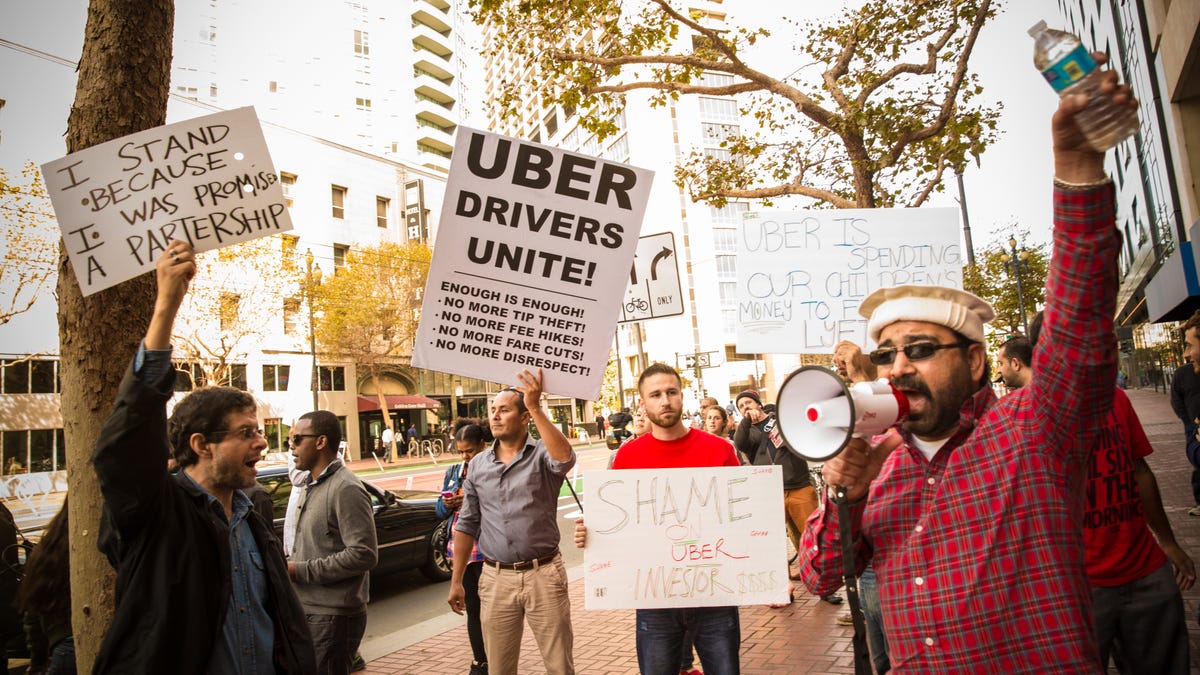Uber, Lyft drivers hit roadblock on Seattle labor union law
A federal appeals court says no to collective bargaining, for now.

Uber drivers protested over low wages in front of the company's San Francisco headquarters in 2014.
Seattle was the first US city to pass a law allowing Uber and Lyft drivers to unionize. But since that law passed in 2015, the business community has continually challenged it.
A federal appeals court sided with the business community on Friday. The 9th US Circuit Court of Appeals issued a decision saying Seattle doesn't have the authority to say whether drivers can collectively bargain over the fees ride-hailing companies charge them, according to Reuters.
The court was examining Seattle's law because of a lawsuit brought last year by the US Chamber of Commerce, which lists Uber and Lyft as members.
"The chamber brought this lawsuit because allowing every city or town to create its own unionization scheme would have burdened innovation, increased prices, killed jobs, and harmed consumers," a US Chamber spokeswoman said in an email. The chamber has also argued that Seattle's ordinance violates federal antitrust laws because it could allow independent contractors to collude through collective bargaining and fix prices.
"The court's decision is a win for rideshare drivers, riders and the entire Seattle community," said Uber spokesman Caleb Weaver.
Lyft, too, said it was pleased with the decision. "This positive development will maintain the flexibility of drivers to choose when, where and for how long they drive -- the very things that make Lyft so attractive to drivers and useful for passengers," Lyft spokesman Adrian Durbin said.
The fight over Seattle's ordinance is part of a bigger battle over the classification of drivers. Since drivers are classified as independent contractors, and not employees, they can't form unions. Some drivers and labor rights advocates say Uber and Lyft reap a financial windfall by treating drivers as contractors and thus avoiding higher costs such as paying benefits, overtime and insurance. If drivers could unionize, they'd be able to have leverage in negotiating pay and perks.
"The city is currently evaluating its next steps consistent with its commitment to protecting worker rights," Seattle City Attorney Pete Holmes said in an email.
Under Seattle's law, the city was required to pick one union to represent its roughly 9,000 drivers, according to Reuters. But the law never went into effect because of the suit filed by the chamber.
Though the 9th Circuit ruled Friday that ride-hail drivers couldn't negotiate fees, it did say states could regulate the rates Uber and Lyft charge passengers. It also said city laws on collective bargaining couldn't be pre-empted by federal labor law.
"The court reiterated that federal law does not cover independent contractors," Holmes said. "And that state and local governments are free to regulate their labor relations in the manner they deem most appropriate."
The appeals court didn't comment on the chamber's antitrust claims and instead sent the case back to district court to consider those arguments.
First published May 11, 4:38 p.m. PT.
Update, May 14 at 12:11 p.m. PT: Adds comment from US Chamber of Commerce spokeswoman.
Rebooting the Reef: CNET dives deep into how tech can help save Australia's Great Barrier Reef.
The Smartest Stuff:Innovators are thinking up new ways to make you, and the things around you, smarter.

